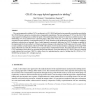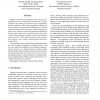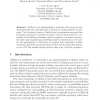114
click to vote
PPDP
2010
Springer
14 years 12 months ago
2010
Springer
Transaction Logic is a logic for representing declarative and procedural knowledge in logic programming, databases, and AI. It has been successful in areas as diverse as workflows...
122
click to vote
CORR
2007
Springer
15 years 2 months ago
2007
Springer
Recently there has been a growing interest of research in tabling in the logic programming community because of its usefulness in a variety of application domains including progra...
116
click to vote
PADL
2010
Springer
15 years 4 months ago
2010
Springer
Newer Prolog implementations commonly offer support for multi-threading, and have also begun to offer support for tabling. However, most implementations do not yet integrate tablin...
126
click to vote
ICLP
2010
Springer
15 years 6 months ago
2010
Springer
ProbLog is a probabilistic framework that extends Prolog with probabilistic facts. To compute the probability of a query, the complete SLD proof tree of the query is collected as a...
102
click to vote
PADL
1999
Springer
15 years 6 months ago
1999
Springer
The copying approach to tabling (CAT) is an alternative to SLG-WAM and based on incrementally copying the areas that the SLG-WAM freezes to preserve execution states of suspended ...
115
click to vote
PADL
1999
Springer
15 years 6 months ago
1999
Springer
Abstract. One important advantage of logic programming is that it allows the implicit exploitation of parallelism. Towards this goal, we suggest that or-parallelism can be efficien...
100
click to vote
ICLP
1999
Springer
15 years 6 months ago
1999
Springer
Delaying-based tabling mechanisms, such as the one adopted in XSB, are nonlinear in the sense that the computation state of delayed calls has to be preserved. In this paper, we pr...
123
click to vote
IPPS
2002
IEEE
15 years 7 months ago
2002
IEEE
Tabling or memoing is a technique where one stores intermediate answers to a problem so that they can be reused in further calls. Tabling is of interest to logic programming becau...
116
click to vote
PPDP
2004
Springer
15 years 7 months ago
2004
Springer
We introduce just enough tabling (JET), a mechanism to suspend and resume the tabled execution of logic programs at an arbitrary point. In particular, JET allows pruning of tabled...
135
click to vote
EUROPAR
2004
Springer
15 years 7 months ago
2004
Springer
Tabling is an implementation technique that improves the declarativeness and expressiveness of Prolog by reusing answers to subgoals. The declarative nature of tabled logic program...



